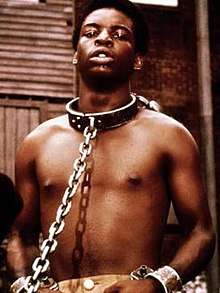Kunta Kinte
Kunta Kinte (c. 1750 – c. 1822; /ˈkuːntɑː ˈkɪnteɪ/ KOON-tah KIN-tay) is a character in the 1976 novel Roots: The Saga of an American Family by American author Alex Haley. According to Haley, Kunta Kinte was based on one of his ancestors: a Gambian man who was born in 1750, enslaved and taken to America and who died in 1822. Haley said that his account of Kunta's life in Roots was a mixture of fact and fiction. The extent to which Kunta Kinte is based on fact is disputed.[1]
Kunta Kinte | |
|---|---|
 LeVar Burton as Kunta Kinte in the TV miniseries Roots | |
| Born | c. 1750 |
| Died | c. 1822 (aged c.71–77) |
| Family | Omoro (father) Binta (mother) Belle (wife) Kizzy (daughter) George (grandson) Tom (great-grandson) |
Kunta Kinte's life story also figured in two US-made television series based on the book: the original 1977 TV miniseries Roots,[2] and a 2016 remake of the same name. In the original miniseries, the character was portrayed as a teenager by LeVar Burton and as an adult by John Amos. In the 2016 miniseries, he is portrayed by Malachi Kirby.[3] Additionally, Burton reprised his role as Kunta in the TV movie Roots: The Gift, a fictional tale originally broadcast during the 1988 Christmas season.
Life as told in Roots
According to Roots, Kunta Kinte was born circa 1750 in the Mandinka village of Juffure, in the Gambia. He was raised in a Muslim family.[4][5] One day in 1767, while Kunta was searching for wood to make a drum for his younger brother, four men chased him, surrounded him, and took him captive. Kunta awoke to find himself blindfolded, gagged, bound, and a prisoner. He and others were put on the slave ship the Lord Ligonier for a four-month Middle Passage voyage to North America.
Kunta survived the trip to Maryland and was sold to John Waller (Reynolds in the 1977 miniseries), a Virginia plantation owner in Spotsylvania County, who renamed him Toby (In the 2016 remake, he is named by John's wife Elizabeth). He rejected the name imposed upon him by his owners and refused to speak to others. After being recaptured during the last of his four escape attempts, the slave catchers gave him a choice: he would be castrated or have his right foot cut off. He chose to have his foot cut off, and the men cut off the front half of his right foot. As the years passed, Kunta, now owned by John's brother Dr. William Waller, resigned himself to his fate and became more open and sociable with his fellow slaves, while never forgetting who he was or where he came from.
Kunta married an enslaved woman named Bell Waller and they had a daughter whom they named Kizzy (Keisa, in Mandinka), which in Kunta's native language means "to stay put" (he gave her this name in order to protect her from being sold away). When Kizzy was in her late teens, she was sold away to North Carolina when William Waller discovered that she had written a fake traveling pass for an enslaved young man, Noah, with whom she was in love (she had been taught to read and write secretly by Missy Anne, the niece of the plantation owner). Her new owner, Thomas Lea (Moore in the 1977 miniseries), immediately raped her and fathered her only child whom he named George, so named after Tom's first slave (or his father, according to the 2016 miniseries), who spent his life with the tag "Chicken George", because of his assigned duties of tending to his master's cockfighting birds.
In the novel, Kizzy never learns her parents' fate. She spends the remainder of her life as a field hand on the Lea plantation in North Carolina. According to the 1977 miniseries, Kizzy is taken back to visit the Reynolds plantation later in life. She discovers that her mother was sold off to another plantation and that her father died of a broken heart two years later, in 1822. She finds his grave, where she crosses out his slave name Toby from the tombstone and writes his original name Kunta Kinte instead. Kizzy is Haley's only ancestor in the genealogy link to Kunta Kinte, who spent the majority of his life in slavery.
The latter part of the book tells of the generations between Kizzy and Alex Haley, describing their suffering, losses and eventual triumphs in America. Alex Haley claimed to be a seventh-generation descendant of Kunta Kinte.[6]
Historical accuracy
Haley claimed that his sources for the origins of Kinte were oral family tradition and a man he found in the Gambia named Kebba Kanga Fofana, who claimed to be a griot with knowledge about the Kinte clan. He described them as a family in which the men were blacksmiths, descended from a marabout named Kairaba Kunta Kinte, originally from Mauritania. Haley quoted Fofana as telling him: "About the time the king's soldiers came, the eldest of these four sons, Kunta, went away from this village to chop wood and was never seen again."[7]
However, journalists and historians later discovered that Fofana was not a griot. In retelling the Kinte story, Fofana changed crucial details, including his father's name, his brothers' names, his age, and even omitted the year when he went missing. At one point, he even placed Kunta Kinte in a generation that was alive in the twentieth century. It was also discovered that elders and griots could not give reliable genealogical lineages before the mid-19th century, with the single apparent exception of Kunta Kinte. It appears that Haley had told so many people about Kunta Kinte that he had created a case of circular reporting. Instead of independent confirmation of the Kunta Kinte story, he was actually hearing his own words repeated back to him.[8][9]
After Haley's book became nationally famous, American author Harold Courlander noted that the section describing Kinte's life was apparently taken from Courlander's own novel The African. Haley at first dismissed the charge, but later issued a public statement affirming that Courlander's book had been the source, and Haley attributed the error to a mistake of one of his assistant researchers. Courlander sued Haley for copyright infringement, which Haley settled out of court.
In popular culture
Kunta Kinte has inspired a reggae riddim of the same name. This started off life as a track called Beware Of Your Enemies released from Jamaicas Channel One. A dub version, put out in 1976 by Channel One house band The Revolutionaries became a sound system anthem for many years on dubplate, and inspired a UK version produced by Mad Professor in 1981. It has also inspired jungle covers.[10]
There is an annual Kunta Kinte Heritage Festival held in Maryland.[11]
In The Fresh Prince of Bel-Air, Will Smith's character says, in regard to being punished, "Why don't you just do me like Kunta Kinte and chop off my foot?"[12]
In Spike Lee's 1989 film Do The Right Thing, the film's main character Mookie (played by Spike Lee) says, in response to his girlfriend telling him to get back to work, "Slavery days are over. My name ain't Kunta Kinte." [13]
Rapper and songwriter Kendrick Lamar references Kunta Kinte in his 2015 single release, "King Kunta".[14]
Comedian Dave Chappelle references Kunta Kinte in his highly acclaimed Chappelle's Show in the sketch The World Series of Dice (Ep: 2.7). [15]
Spoken word artist J.ivy references "the heart of Kunta Kinte" on a track he made with Kanye West and Jay-Z, on West's song "Never Let Me Down" from his 2004 album The College Dropout.[16]
Kunta is also mentioned in Busta Rhymes's song "Rhymes Galore" from the 1997 album When Disaster Strikes. [17]
Kunta is mentioned in Bloodhound Gang's song "A Lapdance Is So Much Better When the Stripper Is Crying" from the 2000 album Hooray for Boobies.[18]
Kunta is mentioned in the Ludacris song "Coming 2 America" from his 2001 album Word Of Mouf.[19]
Ice Cube mentions Kunta Kinte, as well as Kunta's slave name, Toby, in his controversial track "No Vaseline". He also uses it in his 1995 movie, Friday.[20]
Kunta is briefly referenced in Missy Elliott's hit "Work It."[21]
In the barbershop scene of Coming To America, the Jewish man calls Akeem "Kunta Kinte."[22]
In Everybody Hates Chris Season 4 Episode 5 Chris' history teacher/football coach says "Et tu, Kunta Kinte" to Chris.
Season 3, episode 3 of the PBS television show Finding Your Roots with Henry Louis Gates Jr. shared the family trees of actor Maya Rudolph, television writer and producer Shonda Rhimes, and comedian Keenan Ivory Wayans. Keenan references Kunta Kinte in his segment.
In the movie In the Loop, the inept aide to Minister Simon Foster, Toby, is blackmailed into working for Malcolm, the Communications Director. Malcolm labels Toby as his personal Kunta Kinte.
In Diary of a Mad Black Woman, Madea references Kunta Kinte when arguing with Joe.
Kunta Kinte is mentioned in the 2018 Migos song "Made Men" in the line, "No Kunta Kinte, but we slave for it (no Kunta Kinte)."[23]
NFL player Colin Kaepernick wore a tshirt with "Kunta Kinte" emblazoned on it to his controversial NFL tryout, CNN interpreted this as "Kaepernick appeared to use the reference to make a statement: He will not change who he is to appease the powers that be." [24]
See also
- Kunta Kinteh Island in the Gambia
- List of slaves
References
- "The Roots of Alex Haley". BBC Television Documentary. 1997".
- Bird, J.B. "ROOTS". Museum.tv. Retrieved November 21, 2007.
- Campbell, Sabrina. "Malachi Kirby is Kunta Kinte in 'Roots' Remake". NBC News. Retrieved January 3, 2017.
- Thomas, Griselda (2014). "The Influence of Malcolm X and Islam on Black Identity". Muslims and American Popular Culture. ABC-CLIO. pp. 48–49. ISBN 9780313379635.
- Hasan, Asma Gull (2002). "Islam and Slavery in Early American History: The Roots Story". American Muslims: The New Generation Second Edition. A&C Black. p. 14. ISBN 9780826414168.
- "The Kunta Kinte – Alex Haley Foundation". Kintehaley.org. Archived from the original on September 27, 2007. Retrieved November 11, 2007.
- Alex Haley, "Black history, oral history, and genealogy", pp. 9–19, at p. 18.
- Ottaway, Mark (April 10, 1977). "Tangled Roots". The Sunday Times. pp. 17, 21.
- Wright, Donald R. (1981). "Uprooting Kunta Kinte: On the Perils of Relying on Encyclopedic Informants". History in Africa. 8: 205–217. doi:10.2307/3171516. JSTOR 3171516.
- "Riddimology 001: "Kunta Kinte"". Dub-stuy.com. August 5, 2018.
- "Kunta Kinte Heritage Festival". Kuntakinte.org. Kunta Kinte Celebrations, Inc. Retrieved May 16, 2016.
- "Will Gets a Job". Fresh Prince of Bel Air. Season 2. Episode 3. September 23, 1991. NBC.
- "Do The Right Thing by Spike Lee". March 1, 1988. Retrieved May 30, 2020.
- "Kendrick Lamar – King Kunta". Genius. Retrieved January 3, 2017.
- "Chappelle's Show - The World Series of Dice". Dave chappelle. Retrieved March 3, 2004.
- "10 references to Kunta Kinte in popular culture to get you ready for the Roots remake". Guide. Retrieved October 9, 2017.
- "Busta Rhymes - Rhymes Galore". Genius. Retrieved September 20, 2018.
- "Bloodhound Gang - A Lap Dance Is So Much Better When The Stripper Is Crying". Genius. Retrieved October 1, 2018.
- "Work that track, whip 'em like Kunta". Genius. Retrieved January 3, 2017.
- "Ice Cube – No Vaseline". Genius. Retrieved January 3, 2017.
- "Missy Elliott – Work It". Genius. Retrieved January 3, 2017.
- "10 Royal Facts About Coming to America". April 16, 2016. Retrieved November 3, 2017.
- "Not Toby, but we slave for it (Not Toby) / No Kunta Kinte, but we slave for it (No Kunta Kinte) / I waited some days for it (Days)". Genius. Retrieved November 22, 2019.
- Levenson, Eric. "Why Colin Kaepernick wore a 'Kunta Kinte' shirt to his NFL workout". CNN. Retrieved February 14, 2020.
